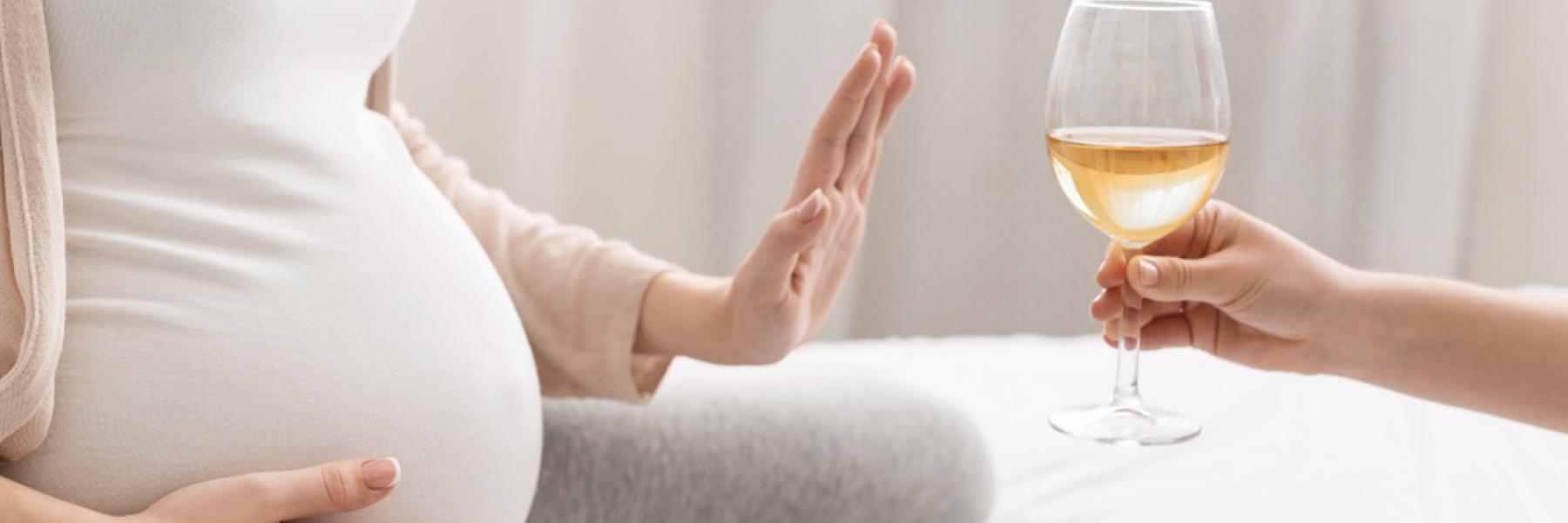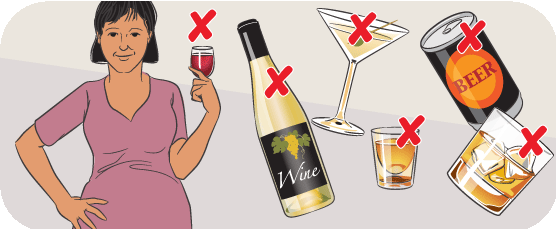
Alcohol and Pregnancy
No Safe Level
Pregnancy is a time of joy and celebration, but sometimes it can be difficult and stressful. There is a lot of information, but not always agreement, about what is “safe” and “unsafe” during pregnancy. One thing, however, is certain: for pregnant women, there is no safe level of alcohol use.

In fact, it is recommended that you and your partner stop drinking while you are trying to conceive, since even a small amount of alcohol can have negative effects on your baby.
Risks of alcohol use to you and your baby
Any alcohol that you consume during your pregnancy passes directly to your baby, and it can cause damage to their growth and development. There is no way to tell how your alcohol consumption will affect your unborn baby, but some serious risks include:
- Low birth weight
- Premature birth
- Miscarriage (Loss of your baby before 20 weeks)
- Stillbirth (Loss of your baby after 20 weeks)
- Fetal Alcohol Spectrum Disorder (FASD) - a range of physical, mental, behavioural and learning disabilities.
-
Risks to you when drinking alcohol
There are risks to your health if you drink alcohol. Drinking alcohol can increase the risk of:
- Damage to your liver,
- High blood pressure,
- Falls or accidents, which may hurt you and your baby,
- Type 2 diabetes,
- Nutritional deficiency,
- Mental health conditions.
Tips to stay alcohol-free during your pregnancy
For many women, it can be difficult to avoid alcohol during pregnancy. It can be even harder in social situations and in the early stages of your pregnancy when you have not shared your news. Below are some ways to help stay alcohol free in pregnancy:
- Drink alcohol-free alternatives. E.g.: Alcohol-free wine, alcohol-free beer, mocktails, etc.
- Replace alcohol consumption with activities that help you to relax or wind down after a long day. E.g.: Taking a bath or shower, going for a walk, practicing mindfulness, etc.
- Telling your partner, close friends or family that you need support to stay alcohol free
- Suggest breakfast or lunch catch ups where alcohol is less common
Some helpful suggestions that you can use in social settings when offered a drink:
- No thanks, I’m driving today/tonight
- Thanks for the offer, but I’m taking a break from drinking
- I’m on a health challenge and have given up alcohol
For more suggestions go to FARE.
How can I help my partner, family-member, or friend stay alcohol-free during pregnancy?
There is a lot that you can do to support your pregnant partner, family member, or friend to stay alcohol-free during their pregnancy.
- Going alcohol-free with them,
- Being mindful of your own drinking around pregnant women ,
- Offering alcohol-free alternatives at home and socially,
- Socialise in ways that do not involve alcohol,
- Being compassionate and understanding of their situation.
Where can I get help if I am finding it difficult to stay alcohol-free during my pregnancy?
Giving up something can often be difficult. Drinking less at any stage of pregnancy will be good for your baby, but if you can’t stop drinking, talk to a health professional as soon as possible.
For local support:
- Visit your GP/Doctor, midwife or obstetrician
- Call Drug Health Services on 1300 031 131 or visit their website for services that can support women and their families to reduce alcohol consumption.
For mental health support:
- Beyond Blue: 1300 244 636. Click here for the free anonymous chat line.
- Lifeline: 13 11 14
- Lifeline Text: 0477 131 114
For more information and support:
- Alcohol and Drug Foundation: 1300 858 584
- Get Healthy Service Alcohol Program: 1300 806 258
- National Organisation for Fetal Alcohol Spectrum Disorder (NOFASD): 1800 860 613
[Source: Better Health Vic, 2019. Commonwealth of Australia, 2020. Royal Womans Hospital, 2022. Pregnancy, Birth & Baby, 2020. Australian Government, 2022. FARE, 2022.]
Related Topics

Smoking during pregnancy is the most common preventable risk factor that causes pregnancy complications.

